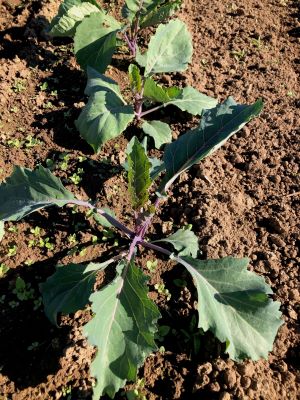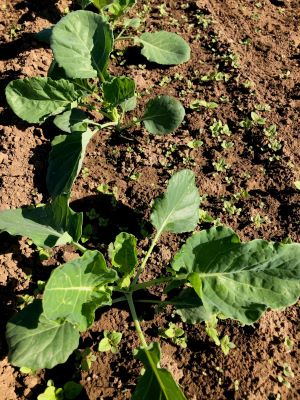Author: Norah Hummel, Seed Savers Exchange
Publish Date: Fall 2020
A national effort is under way to celebrate the beloved but often underappreciated collard. The multi-phase Heirloom Collard Project aims to build a coalition of seed stewards, gardeners, farmers, chefs, and seed companies to preserve heirloom collard varieties and their culinary heritage. Organizing partners include Seed Savers Exchange, Southern Exposure Seed Exchange, The Utopian Seed Project, Working Food, SeedLinked, and the Culinary Breeding Network.
The Heirloom Collard Project was launched in 2016 by Seed Savers Exchange and Ira Wallace — worker/owner of Southern Exposure Seed Exchange and longtime collard steward. Both intrigued by the collard varieties mentioned in the book Collards: A Southern Tradition from Seed to Table, authors Edward Davis and John Morgan, the team requested over 60 collard accessions from the USDA with unique heirloom stories. The initial intent of the project was to make these heirloom collard varieties available to a wider audience by regenerating them at Seed Savers Exchange and with Southern Exposure partners. Since then the project has broadened to encompass five target areas: variety preservation, historical documentation, education and engagement, seed-catalog promotion, and cultural-foodway preservation.
“Collards were grown in my grandmother’s garden like green beans were in the gardens of many other people — they were just a given,” says Wallace. “When I get excited about gardening, a lot of times it is because it reminds me of my grandmother’s garden of collards.”
This movement has inspired seed keepers, growers, historians, and chefs to encourage preservation of these rare family heirlooms, and Seed Savers Exchange and Southern Exposure Seed Exchange, have worked together over the past few years to regenerate several varieties. But there are many more
Fulton Strand, Ole Timey Blue, and Green Glaze (left to right) are three of 20 varieties included in the 2020 Collard Variety Trial.
Photos from OSU North Willamette Research and Extension Center in Aurora, OR.varieties to be grown and stories to be shared.
Phase One: 2020 Collard Variety TrialThe Collard Variety Trial is the first phase of the larger Heirloom Collard Project. Using the innovative online platform SeedLinked, which connects breeders and farmers to trial vegetable varieties, the Collard Variety Trial has linked 250 farmers and gardeners across the country to trial 18 heirloom collards from Seed Savers Exchange’s vast collection. (The collection was established by donations to Seed Savers Exchange and acquisitions from USDA that were previously collected from seed stewards across the Southeast and written about in Collards.)
By gathering information from a wide diversity of growers across the country, the project aims to document how varieties perform across hardiness zones, cultivate a community of collard growers and eaters, and celebrate the unique heirloom stories of the varieties.
How does the trial work? Each participant was assigned and shipped three varieties to grow and will collect data on traits like germination, yield, and flavor. At the end of the growing season, SeedLinked will synthesize and share the data. The Collard Variety Trial also includes eight screening sites that will grow all 20 varieties (18 heirloom varieties and two varieties common in the seed trade for baseline comparison):
Shantae Johnson, Mudbone Grown Farm, Corbett, Oregon
Heidi Noordijk, Oregon State University, Aurora, Oregon
Melony Edwards, Willowood Farm, Coupeville, Washington
Micaela Colley, Organic Seed Alliance, Chimacum, Washington
Melissa DeSa, University of Florida, Gainesville, Florida
Chris Smith, Utopian Seed Project, Leicester, North Carolina
Rejoice Blackwood, Southern Exposure Seed Exchange, Louisa, Virginia
Jon Jackson, Comfort Farms, Milledgeville, Georgia
Throughout the growing season, the project will share videos, stories, articles on all things collards, from the soil to the table on Instagram, Facebook, and on the Heirloom Collard Project blog.
What’s next
In collaboration with Oregon State University and the Culinary Breeding Network, the Heirloom Collard Project team is planning Collards Week from December 14th-17th 2020 part of the Eat Winter Vegetables Project. This collard celebration will feature pre-recorded presentations, farm tours, and cooking demos, as well as a live eat-in. Future project efforts will focus on establishing a network of seed stewards to regenerate endangered heirloom varieties from the Seed Savers Exchange collection and share them with their communities.
For more information on the Heirloom Collard Project visit the Heirloom Collard Project website: https://heirloomcollards.org/the-collards/.




